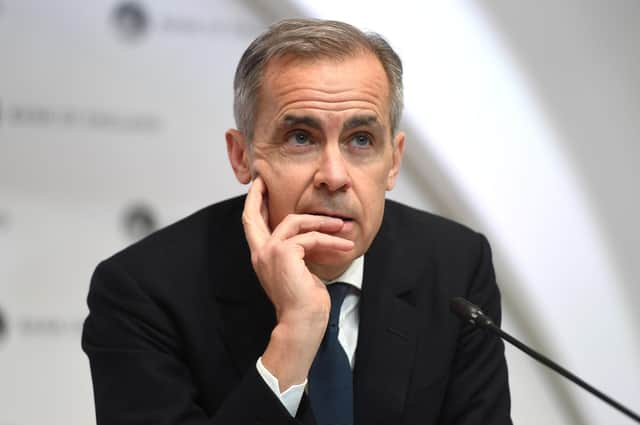Brian Monteith: Mark Carney – not Brexit – helped cause the UK’s inflation


This week we shall hear a lot from many people who have not yet come to terms with that democratic exercise, as they line up to say Brexit has been disastrous. Strangely they often exaggerate their case or even make it up – both traits suggesting a zealousness that will overlook reality and deny anything good about leaving the EU.
Indeed one of regular offender has been at it again. Step forward the former Governor of the Bank of England, Mark Carney, now the United Nations “Special Envoy for Climate Action and Finance”, a cheerleader for our global journey to what will be a perishingly cold net zero. On Friday Mark Carney decided to air his views on inflation and announce that the UK’s inflation is down to Brexit.
Advertisement
Hide AdAdvertisement
Hide AdMark Carney has form for trashing Brexit, saying last year that “in 2016 the British economy was 90% the size of Germany’s. Now it is less than 70%.” In fact the UK’s economy has grown marginally more than Germany’s since 2016 – had he been a Chancellor making that statement in Parliament he would have been guilty of misleading the House.
Now he’s at it again, washing his hands of any responsibility for the UK’s inflation when in fact he played a substantial role in it coming about. It was Mark Carney as Governor of the Bank of England who oversaw the huge rise in quantitative easing as a monetary tool, effectively a clever means to inflate the money supply, and then did not act to wind it down or return interest rates to a realistic value before he left.
Carney, as many people in Scotland will recall, was no ordinary Bank of England Governor, often making political-loaded statements such as before the vote on Scottish independence, and again before the vote on the UK’s EU membership. He always stopped short of declaring for a side but the inference from what he said was explicit and understood.
The UK’s lax monetary policy – that has created a false and mistaken public expectation of continuing low interest rates – is a significant cause for our high inflation. Brexit has nothing to do with our monetary policy, the responsibility lies with the Bank and the Treasury.
Other influences are either home grown, such as our unrealistic energy policies which forcing us to use expensive oil and gas – or global, such as the war in Ukraine, which is driving up the price of foods, fertiliser and energy due to shortages in supply, disrupted supply chains and the impact of our sanctions on imports. Brexit does not even begin to come near to these factors.
You don’t even need to understand monetary policy to find on the internet that other countries inside the EU (and the average for the EU itself) have, at different points during the last year, experienced worse levels of inflation with food inflation on occasion being especially bad in Germany and the Netherlands.
If there is a concern it is the UK’s inflation has not come down as quickly as it should – but that particular difficulty has been caused by the Bank of England being asleep at the wheel, believing over a year ago that inflation would not be a significant and deep-rooted problem.
Quantitative Easing QE had again been used to expand money supply during Covid and due to the ineffective pandemic lockdowns – repeated unnecessarily twice – the supply chains were hugely disrupted. Put simply, the Bank did not begin to raise interest rates early enough and there were many people warning the Bank was getting it wrong – but it stubbornly refused to listen.
Advertisement
Hide AdAdvertisement
Hide AdThis was a serious error for which the Bank should have been held accountable, with the current Governor, Andrew Bailie, being replaced. He now cuts ow a forlorn and hapless figure, but Carney’s responsibility cannot be passed over by him nonchalantly blaming Brexit.
What has been misunderstood from the start – especially by those who were against it – was that leaving the EU was never a guarantee of economic abundance and success – it was about returning the ability to choose our policies for ourselves. What you might call #Brexitfreedoms.
What Brexit has revealed is that many of our politicians – be they for or against Brexit – are simply not up to the job of taking on the responsibility of making decisions for our country.
Moreover, many of our institutions are not up to the job of coping without Brussels spoon-feeding them directives and draft regulations that they can gold plate. In both cases we need to change what we do, who does it and how it is done – fortunately Brexit gives us the ability to chart our own course.
As this week goes on we shall hear more gurning, more scaremongering and more fake facts, ignoring the economic good news and the sign that Brexit successes are happening. I made my own list a year ago and had already identified forty-six in the same week critics were denying there were any.
Some people have yet to come to terms with Brexit. It has happened, the best is not being made of it, and some opponents have intentionally made it a bumpier ride – but it is a great opportunity to make our own decisions and make our political class accountable.
Just as I was happy seven years ago to give up blaming Brussels, people like Mark Carney need to give up on blaming Brexit.